新概念一册49-72课知识点
(完整版)新概念一册知识点梳理
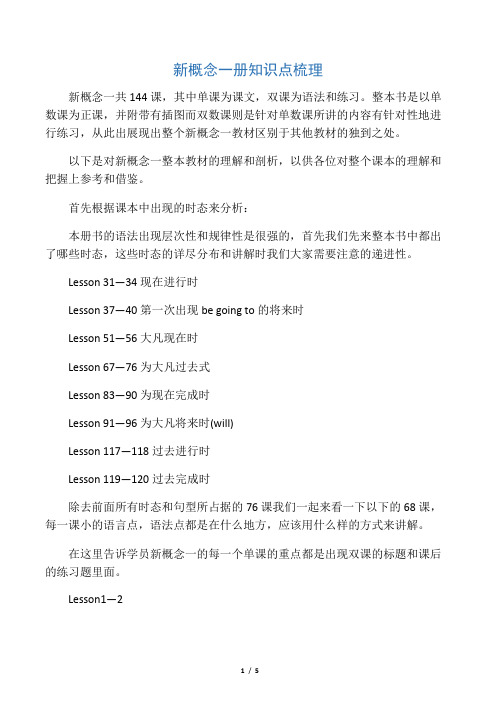
新概念一册知识点梳理新概念一共144课,其中单课为课文,双课为语法和练习。
整本书是以单数课为正课,并附带有插图而双数课则是针对单数课所讲的内容有针对性地进行练习,从此出展现出整个新概念一教材区别于其他教材的独到之处。
以下是对新概念一整本教材的理解和剖析,以供各位对整个课本的理解和把握上参考和借鉴。
首先根据课本中出现的时态来分析:本册书的语法出现层次性和规律性是很强的,首先我们先来整本书中都出了哪些时态,这些时态的详尽分布和讲解时我们大家需要注意的递进性。
Lesson 31—34现在进行时Lesson 37—40第一次出现be going to的将来时Lesson 51—56大凡现在时Lesson 67—76为大凡过去式Lesson 83—90为现在完成时Lesson 91—96为大凡将来时(will)Lesson 117—118过去进行时Lesson 119—120过去完成时除去前面所有时态和句型所占据的76课我们一起来看一下以下的68课,每一课小的语言点,语法点都是在什么地方,应该用什么样的方式来讲解。
在这里告诉学员新概念一的每一个单课的重点都是出现双课的标题和课后的练习题里面。
Lesson1—2语言点:与陌生人说话或引起别人的注意。
Excuse me. Yes? Pardon? Thank you very much.语法点:主系表结构this为主语,名词做表语1的大凡疑问句以及它的肯定回答。
Is thisyour handbag? Yes, it is.Lesson 5—6语言点:如何介绍别人。
This is Miss Sophie Dupont. Nice to meet you.语法点:主语为第三人称单数的主系表结构。
SheisFrench.HeisGerman.It’saVolvo.(L6)a/an的使用。
Lesson 7—8语言点:如何自我介绍和相互认识。
语法点:主语为第二人称的主系表结构。
(完整版)新概念第一册知识点整理,推荐文档
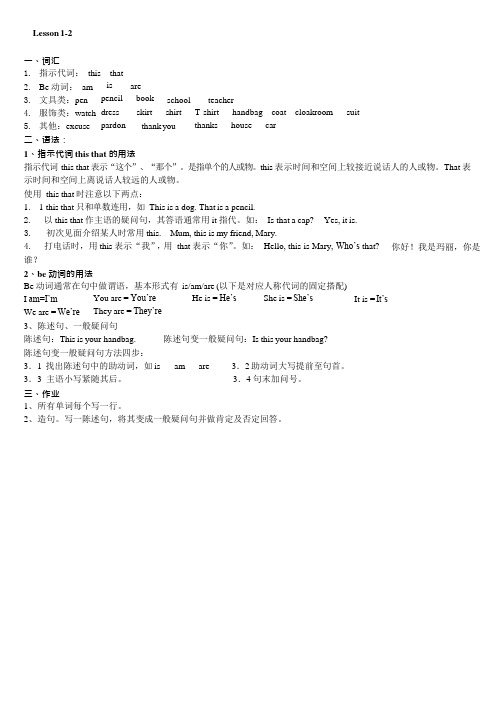
1. I am Rice. (改否定句) 2. His son is a teacher. (改否定句) 3. Mr. Clinton and his wife are busy. (改为否定句) 4. Lily is seven. (改一般疑问句) 5. Are your son a student?(改错)
Lesson 1-2 小测试
Read and choose.
My name Lisa. I
from china.
A. is / am
B. are / is
C. is / are
this a car?
A. am
B. is
C. are
Is this your bag?
A. No, it is.
B. Yes, it isn’t.
2. 非常感谢。
Lesson 3-4
一、词汇 形容词性物主代词: my your his her 名词: umbrella ticket number son 形容词:new good nice 副词:here too 动词:please meet 英语中对男性及女性的称呼: Mr. Sir 二、语法:
Lesson 1-2 小测试 Read and choose. My name Lisa. I
from china.
A. is / am
B. are / is
C. is / are
this a car?
A. am
B. is
C. are
Is this your bag?
A. No, it is.
B. Yes, it isn’t.
B:
?
A: Is this your pencil?
Lesson71-72(课件)新概念英语第一册
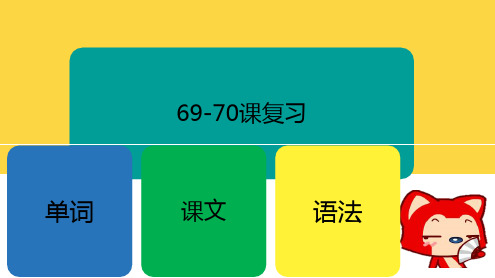
Lesson 71 He’s awful!
He telephoned me four times yesterday, three times the day before yesterday.
the day before yesterday 前天 时间状语
did not arrive I did not arrive home last night. I didn’t arrive home last night.
句型变化
变一般疑问句
I arrived home last night.
did
arrive
Did you arrive home last night?
Lesson 71 He’s awful!
Watch and answer the question: How did Pauline answer the telephone at nine? This is Pauline’s mother. Please don’t telephone my daughter again.
There be句型在一般过去时中的句型变换
变一般疑问句:Was/Were there…?
There were hundreds of people. Were there hundreds of people? Yes, there were. No, there weren’t.
新概念课堂检测
We are enjoying our lunch.
We
it yesterday, too.
总结
一般过去式 以实义动词引导的一般过去时 动词的过去式变化规则 表示过去时间的时间状语 句型变化
新概念1 61-72课 单词 重点词组 重要句型
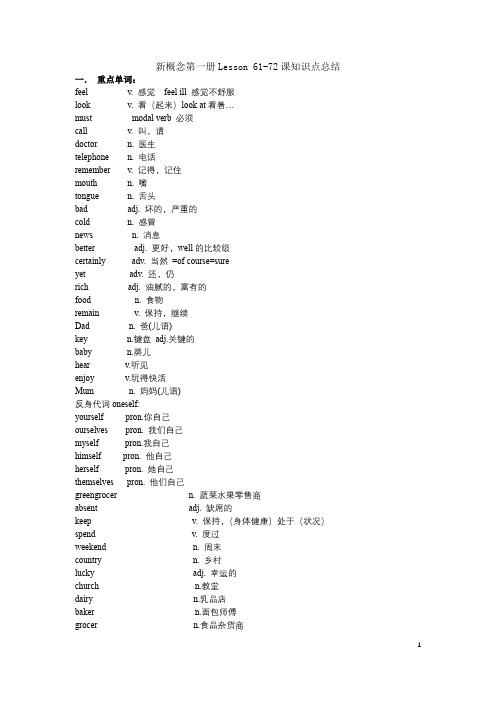
新概念第一册Lesson 61-72课知识点总结一.重点单词:feel v. 感觉feel ill 感觉不舒服look v. 看(起来)look at看着…must modal verb 必须call v. 叫,请doctor n. 医生telephone n. 电话remember v. 记得,记住mouth n. 嘴tongue n. 舌头bad adj. 坏的,严重的cold n. 感冒news n. 消息better adj. 更好,well的比较级certainly adv. 当然=of course=sureyet adv. 还,仍rich adj. 油腻的,富有的food n. 食物remain v. 保持,继续Dad n. 爸(儿语)key n.键盘adj.关键的baby n.婴儿hear v.听见enjoy v.玩得快活Mum n. 妈妈(儿语)反身代词oneself:yourself pron.你自己ourselves pron. 我们自己myself pron.我自己himself pron. 他自己herself pron. 她自己themselves pron. 他们自己greengrocer n. 蔬菜水果零售商absent adj. 缺席的keep v. 保持,(身体健康)处于(状况)spend v. 度过weekend n. 周末country n. 乡村lucky adj. 幸运的church n.教堂dairy n.乳品店baker n.面包师傅grocer n.食品杂货商星期几:Tuesday n. 星期二Wednesday n. 星期三Thursday n. 星期四Friday n. 星期五Saturday n. 星期六Sunday n. 星期日was v.是(am的一般过去时)were v.是(are的一般过去时)year n.年race n. 比赛town n. 城镇crowd n.人群stand v.站立,忍受exciting adj. 使人激动的(修饰物) excited adj.兴奋的,激动的(修饰人)just adv.正好,恰好finish n. 结尾,结束v.完成winner n.获胜者win v.获胜,赢得behind prep.在…之后stationer n.文具商awful adj. 让人讨厌的,坏的telephone v. & n. 打电话;电话time n. 次(数);时间answer v. 接(电话);回答last adj. 最后的,前一次的tonight 今晚phone n. 电话(=telephone)again adv. 又一次地say (said) /sed/ v. 说said(say的过去时)说二. 重点词组:call the doctor请医生call sb. up给某人打电话remember to do sth. 记得去做某事remember doing sth. 记得做过某事be bad for对…有坏处have a bad cold患重感冒good news好消息a piece of news 一则新闻stay in bed躺在床上feel ill 感觉不舒服take some medicine吃药see a doctor看医生have a temperature发烧take one’s temperature量某人的体温get up 起床rich food 油腻的食物play with… 玩…东西make a noise 制造噪音drive quickly 快速地开车lean out of…身体探出…the key to the door 门钥匙the key to the problem 问题的答案hear sb. do sth. 听见某人做过某事hear sb. doing sth. 听见某人正在做某事enjoy oneself 某人玩得开心enjoy sth./ doing sth. 喜欢某物/喜欢做某事by oneself 独自,独立at the greengrocer’s 在蔬菜水果店be absent from school 没去上学for the weekend 整个周末at the weekend 在周末at the baker’s 在面包店at the grocer’s 在杂货店at the stationer’s 在文具店win/lose a race 赢/输比赛in the crowd 在人群中crowd into… 涌入、挤进an exciting race 激动人心的比赛finish sth./doing sth. 完成做某事all the time 一直on time 按时,准时in time 及时answer the phone 接电话answer the door 应声开门answer a letter 回信on one’s way home 在某人回家的路上last night 昨夜again and again 屡次地,再三地三. 重点知识点:1.must do sth必须做某事,You mustn't do …你不准做某事,相当于祈使句D on’t do…对must引导的一般疑问句否定回答用you needn't2.感官动词➕形容词表示主观感受3.remember to do和remember doing的区别4.have ➕疾病的用法5.复习must的用法,强调must引导的一般疑问句的否定回答用:No,sb. needn't6.remain in bed=keep in bed=stay in bed7.keep ➕名词(代词)➕形容词,表示保持某种状态,例如keep quiet,keep the eggswarm8.do sth for ➕一段时间,表示做某事做了一段时间,如I sleep for 6 hours everyday9.复习can和must的用法,must的否定句是mustn’t,否定回答是needn’t.10.enjoy +oneself反身代词(好好玩吧),=have a good time. 反身代词的用法,详见PPT11.关于年龄的表达:基数词+years+old12.be动词的一般过去时,am改成was,are改成were13.when和where的用法14.日期和时间的表达,以及序数词15.一般过去时的there be句型,表示过去存在的状态。
新概念英语第一册语法知识点总结

新概念英语第一册语法知识点总结《新概念英语》是1997年由外语教学与研究出版社和培生教育出版中国有限公司联合出版的一套英语教材。
第一册有哪些语法知识点呢?接下来店铺为你整理了新概念英语第一册语法知识点总结,一起来看看吧。
新概念英语第一册语法知识点总结(一)第几课教学内容教学目标及要求1-21,Excuse me2,Is this your…?1,要求学生灵活运用句型:Is this your…?2,pardon和excuse me的用法3,L1、2课的单词及L1的课文要求能背诵。
3-43,Sorry,sir.4,Is this your…?1,继续巩固句型:Is this your…?2,新句型:祈使句 My____, please.否定句 This is(not)____.3,L3、4课的单词及L3的课文要求背诵5-65,nice to meet you6, What makeis it?1,主语为第三人称单数的主系表结构,She/ He/I t is…2,了解一些常见国籍的拼读3,This is …(一般用于将某人介绍给他人的句式)4,Nice to meet you.(用于初次与朋友、同学见面的问好)5,认知一些汽车的品牌6,国籍、汽车品牌要求会认读,其他单词及课文要求背诵7-87,Are you a teacher?8,What’s yourjob?1,重点句型:Are you …?/ What’s your job?/ What nationality are you?I’m…(介绍自己:名字,国籍以及职业等)2,I am的缩写(I’m)3,不定冠词a, an9-109, How are you today?10, Look at…1,重点句型:How are you?(朋友或相识的人之间见面时的寒暄话)2,如何问候他人(How is …?)3,nice to see you .(见面时的客气话)4,Look at…(看…)。
新概念第一册英语全面语法总结 (1)
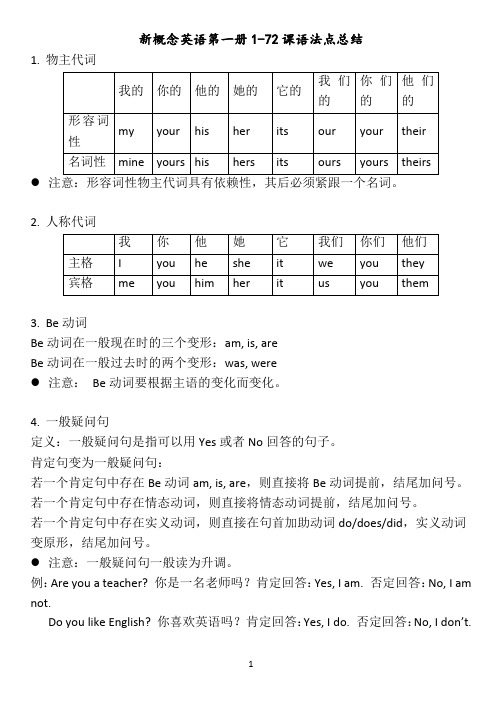
新概念英语第一册1-72课语法点总结1.物主代词我的你的他的她的它的我们的你们的他们的形容词性my your his her its our your their 名词性mine yours his hers its ours yours theirs●注意:形容词性物主代词具有依赖性,其后必须紧跟一个名词。
2.人称代词我你他她它我们你们他们主格I you he she it we you they宾格me you him her it us you them3.Be动词Be动词在一般现在时的三个变形:am, is, areBe动词在一般过去时的两个变形:was, were●注意:Be动词要根据主语的变化而变化。
4.一般疑问句定义:一般疑问句是指可以用Yes或者No回答的句子。
肯定句变为一般疑问句:若一个肯定句中存在Be动词am, is, are,则直接将Be动词提前,结尾加问号。
若一个肯定句中存在情态动词,则直接将情态动词提前,结尾加问号。
若一个肯定句中存在实义动词,则直接在句首加助动词do/does/did,实义动词变原形,结尾加问号。
●注意:一般疑问句一般读为升调。
例:Are you a teacher? 你是一名老师吗?肯定回答:Yes, I am. 否定回答:No, I am not.Do you like English? 你喜欢英语吗?肯定回答:Yes, I do. 否定回答:No, I don’t.5.特殊疑问句定义:不能用Yes或者No回答的句子。
构成:特殊疑问词+ 一般疑问句特殊疑问词:what(什么), when(何时), where(何地), who(谁), whom (谁宾格), whose(谁的), which(哪个), why(为什么), how(怎么样)口诀:非常八加一6.不定冠词a/an若单词是以“a, e, i, o”四个元音开头,其前面选用“an”;若单词是以元音字母“u”开头,视情况而定。
新概念第一册49课课件资料讲解
MRS.BIRD: My husband likes__st_e_a_k_, but he__d_o_e_s_n_'t_l_ik_e_c_h_i_c_ke_n__.
BUTCHER: To tell you the __tr_u_th____,Mrs.Bird, I don't like chicken__e_i_th_e_r__!
butcher
the butcher's shop ['bʊtʃə]
pork [pɔːk]
beef [biːf]
Do you know any other meat?
steak [steɪk]
lamb [læ m]
chicken
mince [mɪns]
[biːf] beef
['tʃɪkEn] chicken [steɪk] steak [læ m] lamb [mɪns] mince
BUTCHER: Do you want__b_e_e_f _or_l_a_m_b___? MRS.BIRD: _B_e_e_f___,please.
BUTCHER: This__la_m__b_'s__ very good. MRS.BIRD: I like_l_a_m_b___,but my_h_u_s_b_a_n_d__d_o_e_s_n_'t_.
I like lamb, but my husband doesn't (like lamb).
Page 100
Fill the gaps using ‘ am not, aren’t, isn’t, can’t, don’t ‘ or ‘ doesn’t ’. •He likes coffee, but I __d_o_n.’t •She likes tea, but he ___d_oe.sn’t •He is eating some bread, but she __is_n_’t. •She can type very well, but he ___ca_n.’t •They are working hard, but we __ar_e_n’.t •He is reading a magazine, but I _a_m__no. t
新概念第一册1-72课语法总结和练习期中试题
一、写出下列动词的现在分词: play___run_____swim____make_____go___ study_____write___read____have_____ sing ____ dance _____ put ____ see____ buy____;eat______live____take____come__ get_____stop_____sit____shop_____ chat_____rain_____take _____ fly______
8.What
is our son doing? listening(listen ) to music. He is ______ 9. It’s 5 o’clock now. are having We______(have)supper now. Is washing 10.______Helen________(wash )clothes? Yes ,she is .
三、句型转换: 1.
They are doing housework . 一般疑问句: 否定句: 2.The students are cleaning the classroom . 一般疑问句: 否定句: 3.I’m playing football in the playground .(对划线部分进行提问) 4.Tom is reading books in his study . (对划线部分进行提问)
6.I
_______ my eraser, but I can’t ______ it. A.look for , finding B.am finding, look for C.am looking for, find D.find, look for 7.------_____ you like to go home? ----- Yes, I’m ______ the bus. A.Do, waiting B.Would , waiting for C. Would , wait for D. Are , waiting for 8.He says he ______ his motherland all the time. A. loves B. is loving C.loving D. love
新概念英语第一册第49课
新概念英语第一册第49课
首先,一个理想的学生应该具有良好的学习态度和积极的学习动力。
他们应该对学习充满热情,并且愿意付出努力来取得好的成绩。
他们应该有良好的学习习惯,如按时完成作业、复习课堂内容和积极参与课堂讨论等。
其次,一个理想的学生应该具备良好的沟通和合作能力。
他们应该能够与老师和同学有效地交流和合作。
他们应该尊重他人的意见,并且能够积极参与团队活动和合作项目。
此外,一个理想的学生应该具备批判性思维和问题解决能力。
他们应该能够独立思考,分析问题,并提出合理的解决方案。
他们应该具备批判性思维,能够评估信息的可靠性和有效性,并做出明智的决策。
另外,一个理想的学生应该具备良好的时间管理和自我组织能力。
他们应该能够合理安排时间,有效地管理学习和课余活动。
他们应该能够制定学习计划,并按计划完成任务,避免拖延和浪费时间。
最后,一个理想的学生应该具备积极的态度和良好的道德品质。
他们应该对学习和生活充满积极的态度,并且具备诚实、守时、尊
重他人和乐于助人等良好的道德品质。
总而言之,一个理想的学生应该在学习、沟通、合作、批判性
思维、问题解决、时间管理和道德品质等方面具备全面发展。
他们
应该是积极主动的学习者,具备良好的品质和能力,为自己和社会
做出积极的贡献。
希望以上回答能够满足你的需求,如果还有其他问题,请随时
提出。
新概念英语第一册第49-50课lesson49-50课件
Yes
2.Mrs. Bird’s husband like lamb tNooo.
3. Mrs. Bird like chicken.
No
4.Mrs. Bird doesn’t like chicken. Yes 5. Mrs. Bird’s husband doesn’t likeNsoteak
Detailed study about the passage
or 或者,还是(表示选择)
❖ Do you want beer or wine ? ❖ Beer , please . ❖ Wine , please .
❖ Do you want an apple or a banana ? ❖ An apple , please . ❖ A banana , please .
A. speak B. talk C. say D. tell
❖ either adv(也) My husband likes steak . I like steak too .=I also like steak .
My husband doesn't like chicken, I don't like chicken either .
New Concept English(Book 1) (新概念英语)(第一册)
Have you ever been there?
butcher
❖ ---Do you eat meat every day? ❖ 你每天都吃肉吗? ❖ --- _____________.
Lesson 49 At the butcher’s
New Words and Expressions
butcher meat beef lamb husband steak
- 1、下载文档前请自行甄别文档内容的完整性,平台不提供额外的编辑、内容补充、找答案等附加服务。
- 2、"仅部分预览"的文档,不可在线预览部分如存在完整性等问题,可反馈申请退款(可完整预览的文档不适用该条件!)。
- 3、如文档侵犯您的权益,请联系客服反馈,我们会尽快为您处理(人工客服工作时间:9:00-18:30)。
新一(49-72)知识点 1 褚老师新一(49-72)知识点
一般现在时 一般时大部分描述的是日常的生活:我每天刷牙三次(早中晚);我每天都上班; 客观事实是什么:就是太阳东升西落;光的速度比声音快。 ⒈ I go to school every day. (一般性) ⒉ Peter usually brushes his teeth three times a day.(规律性) ⒊ Sun rises in the east and sets in the west.(客观事实)
类型: 肯定句 Ⅰ.带有动词句子,应注意“三单”使用: 例:I like apples. / He likes pears. / She likes strawberries. Ⅱ.带有Be动词句子,应注意随主语变化而变化Be动词: 例:I am a teacher. / He is a worker. / She is a dancer. They are students. / We are happy.
肯定句总结:即:掌握动词有“三单”变化,遇到“He, she, it 或一个人、一个物”都要变化动词形式,不能全部使用“原形”。 同时还要清楚,除了动词之外还有Be动词,它有三种形式“is ,am ,are”,随主语变化而变化。
否定句 Ⅰ. 带有动词句子的否定,采用“见动词,找助动”口诀: 例:I don’t like apples. / He doesn’t like pears. / They don’t understand. /We don’t want to do homework. Ⅱ. 带有Be动词句子的否定,在Be动词后加NOT即可: 例:I am not a teacher. / She is not a baby. / We are notstudents.
否定句总结:即:掌握“见动词,找助动,找助动,看主语”口诀,攻克动词句子的否定;而带有Be动词句子,只要在原句的Be动词之后加NOT即可.
疑问句 主要掌握2个助动词Do和Does;Do用在复数主语(I, We, They 和 许多人),Does用在单数主语(he, She, It和一个人)。
一般疑问句:即以助动词Do、Does或Be动词Is、Am、Are开头提问的疑问句,回答全部采用Yes或No来回答。 例:Do you go to school every day? -Yes, I do. Does he brush his teeth three times a day? -Yes, he does. Are you a teacher? – No, I am not. Is it a dog? – No, it isn’t.
特殊疑问句: 即采用特殊疑问词“What、when、where、which、why、how”等特殊疑问词开头的疑问句。 例:Where is your mother? – She is in the bookshop.
选择疑问句:即由or作连词连接的两个具有选择的疑问句 例: Do you want beef or lamb? – Beef, please. 新一(49-72)知识点 2 特殊疑问句总结:分两类来记,即带有动词的特殊疑问句和带有Be动词特殊疑问句:特殊疑问词 + 助动词(Do或Does)+ 主语 + Do(动词原形) WHAT + DO + YOU + WANT? WHERE + DOES + SHE + COME FROM?
疑问句重点句型: 1. Do you want any meat? 疑问句中,一些不可以再用“some”而是换成any 2. Do you want beef or lamb? 选择疑问句,用or连接,二者选其一 3 .What about some steak? 表示询问或是给建议时的疑问句,要用some 4. What’s the weather like in spring? What’s …. Like? 表示询问怎么样 What’s the climate like in your country
询问国籍的几种问法: Where do you come from? / Where do they come from? / Where does he come from? / Where does she come from? Where are you from? / Where are they from? / Where is your mother from? / Where is Lily from? 继续复习前面所学一般现在时,又给出了新的询问国籍的句式: What nationality are you? /What nationality are they? What nationality is he? / What nationality is she?
一般现在时的时间状语: Always, often, usually, generally, sometimes, seldom, never 放在主语后,动词前使用: I always go to school on foot. He sometimes goes to work by taxi. In the morning, in the afternoon, In the evening, at night 放在句首或句尾,every day, every year, every week 一般放句尾: Their father takes them to school every day. In the afternoon, they often drink tea together. He usually reads newspaper at night.
继续复习一般现在时的用法以及选择疑问句用法,另外就是询问某人身体的句式和生病的短语。 ★Do you want the large size or the small size? – The large size, please! I want…. / I would like…../ Is that all? / What else do you want?
★What’s the matter with sb. 某人怎么啦? How’s + sb. 某人身体怎么样 / How are you? Stay in bed/ remain in bed/ be in bed 卧床休息,加时间要用介词for+ 时间段 如: He must stay in bed for a week. Have a cold/ catch a cold / have flu 得感冒 Have a headache/ have an earache/have a stomach ache/ have a toothache/ have measles/ have mumps,Have a fever / have a temperature
现在进行时 定义:描述在某个具体时刻,正在发生的事情。 新一(49-72)知识点 3 句型:主语 + Be + doing + 时间状语 例句: I am doing my homework now. She is reading a book at the moment. It's six o’clock, they are having their dinner now.
否定句:在Be动词之后加NOT即可 一般疑问句:将Be动词提前于句首即可 例句:Are you doing your homework now? Is she swimming in the river?
特殊疑问句:特殊疑问词 +Be + 主语 + doing ? WHAT+ARE+ YOU +DOING? WHAT+IS+ SHE +DOING?
现在分词的变化规则:【直、去、双、变】 ⑴【直】一般情况直接加-ing: do-doing/ help-helping/ go-going ⑵【去】以不发音的e结尾,去e加: make-making/ take-taking/live-living ⑶【双】以重读闭音节结尾要双写尾巴: swim-swimming/ cut-cutting/begin-beginning/ put-putting/ sit-sitting/shop-shopping/travel-travelling ⑷【变】以ie结尾,将ie变y加ing: lie-lying / die-dying
情态动词: 情态动词按语气强弱,可以分“小强”和“小妹”级别: ▲最强的“小强”: Must(语气很强烈,不敢惹) 使用频率最多的“小能”: Can(什么都能做) “小能”的胞弟“小酷”: Could(请求别人帮助) “小酷”的好兄弟“小悟”: Would(给别人提供一些东东) 还有大家最熟悉的: Should(大家都会用,“应该”) ▼最弱的“小妹”: May 还有 “小妹妹”: Might(语气弱到不行)
主语+ Must/ can/ could/ may/ should/need + DO(动词原形) 注意情态动词是没有变化形式的,永远都是用原形,也不受主语限制,不管是否三单,都只用原形。没有cans,musts,shoulds 例: We must study hard. He need do some sports.
祈使句:其实很简单,就是指命令或是请求,都是由动词原形构成的简单句! Take this medicine! 吃药!(请求) Open the door! 开门!(请求) Don’t smoke here! 别在这吃药!(命令) Don’t play with matches! 别玩火柴!(命令) You mustn’t lean out of the window! 不要将身体探出窗外!(命令)
